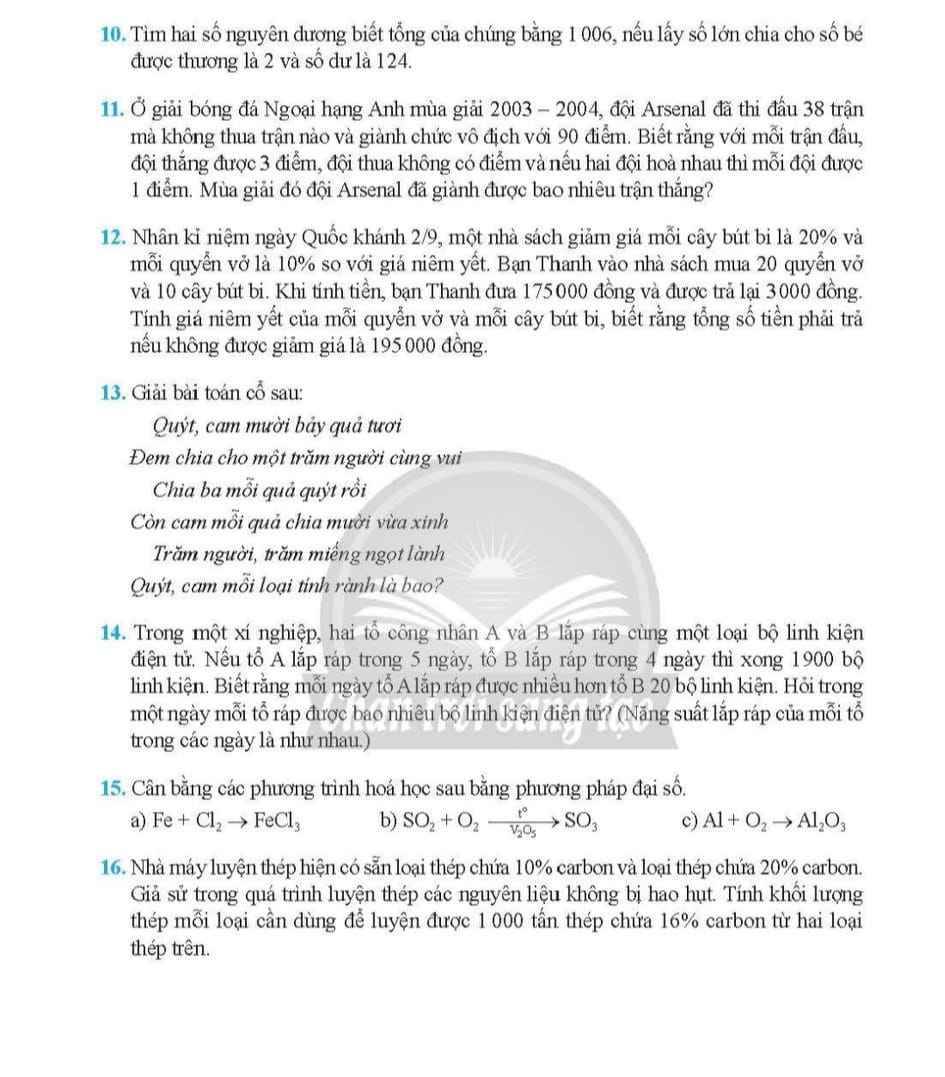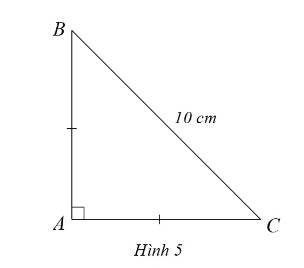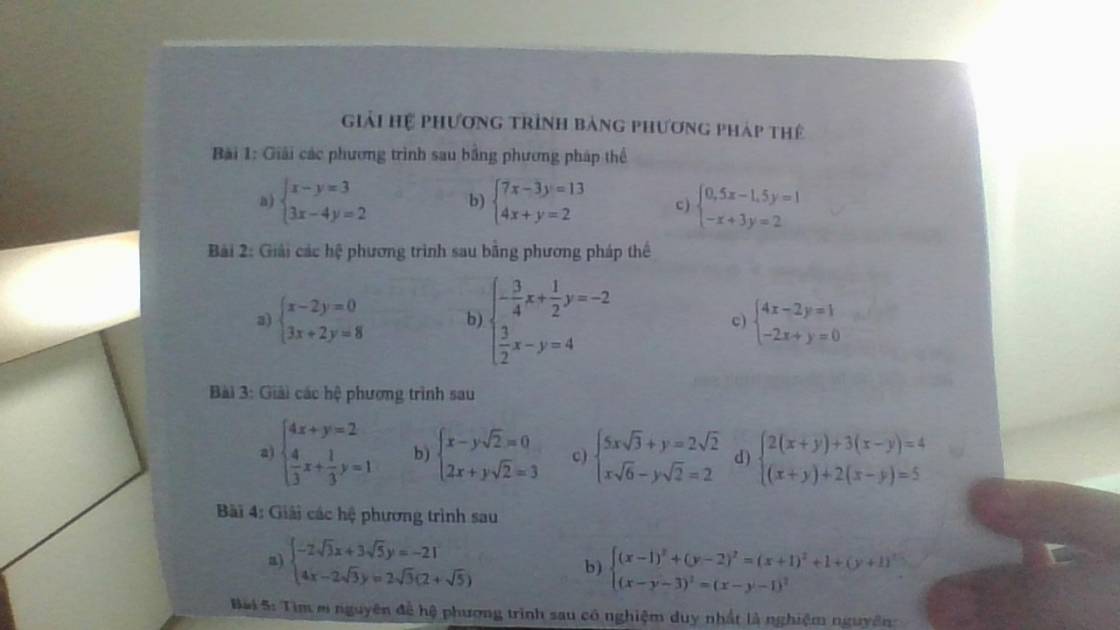cho tam giác ABC vuông tại A. Biết cos C = 4/5 . Tính tỉ số lượng giác của góc B
Hãy nhập câu hỏi của bạn vào đây, nếu là tài khoản VIP, bạn sẽ được ưu tiên trả lời.


\(5x^2-2x+1=\left(4x-1\right)\sqrt{x^2}+1\)
\(\Rightarrow5x^2-2x=\left(4x-1\right)x\)
\(\Rightarrow5x^2-2x=4x^2-x\)
\(\Rightarrow5x^2-4x^2-2x+x=0\)
\(\Rightarrow x^2-x=0\)
\(\Rightarrow x\left(x-1\right)=0\)
\(\Rightarrow\left[{}\begin{matrix}x=0\\x-1=0\end{matrix}\right.\)
\(\Rightarrow\left[{}\begin{matrix}x=0\\x=1\end{matrix}\right.\)
Vậy x=0 hoặc x=1

\(\left[{}\begin{matrix}2x+3=x-5\\2x+3=5-x\end{matrix}\right.\Leftrightarrow\left[{}\begin{matrix}x=-8\\3x=2\end{matrix}\right.\Leftrightarrow\left[{}\begin{matrix}x=-8\\x=\dfrac{2}{3}\end{matrix}\right.\)

14: Gọi số bộ linh kiện trong 1 ngày tổ B lắp được là x(bộ)
(Điều kiện: \(x\in Z^+\))
Số bộ linh kiện trong 1 ngày tổ A lắp được là x+20(bộ)
Trong 5 ngày, tổ A lắp được 5(x+20)(bộ)
Trong 4 ngày, tổ B lắp được 4x(bộ)
Theo đề, ta có phương trình:
5(x+20)+4x=1900
=>9x=1800
=>x=200(nhận)
vậy: số bộ linh kiện trong 1 ngày tổ B lắp được là 200(bộ)
số bộ linh kiện trong 1 ngày tổ A lắp được là 200+20=220(bộ)
Bài 11:
Gọi số trận thắng của Arsenal mùa đó là x(trận)
(Điều kiện: \(x\in Z^+\))
Số trận hòa mùa đó là 38-x(trận)
Số điểm nhận được cho các trận thắng là 3x(điểm)
Số điểm nhận được cho các trận hòa là 1(38-x)=38-x(điểm)
Tổng số điểm là 90 điểm nên ta có:
3x+38-x=90
=>2x=90-38=52
=>x=26(nhận)
Vậy: Số trận thắng mùa đó của Arsenal là 26 trận

\(x^2+\sqrt{x^2-3x+5}=3x+7\)
=>\(\sqrt{x^2-3x+5}=x^2-3x-7\)(1)
Đặt \(x^2-3x+5=a\left(a>=\dfrac{11}{4}\right)\)
(1) sẽ trở thành \(\sqrt{a}=a-12\)
=>\(a=\left(a-12\right)^2\)
=>\(a^2-24a+144-a=0\)
=>\(a^2-25a+144=0\)
=>(a-9)(a-16)=0
=>\(\left[{}\begin{matrix}a=9\\a=16\end{matrix}\right.\Leftrightarrow\left[{}\begin{matrix}x^2-3x+5=9\\x^2-3x+5=16\end{matrix}\right.\)
=>\(\left[{}\begin{matrix}x^2-3x-4=0\\x^2-3x-11=0\end{matrix}\right.\Leftrightarrow\left[{}\begin{matrix}x\in\left\{4;-1\right\}\\x=\dfrac{3\pm\sqrt{53}}{2}\end{matrix}\right.\)

đk x >= 4
\(\sqrt{x-2}=x-4\)
\(\Leftrightarrow x-2=\left(x-4\right)^2\Leftrightarrow x^2-8x+16=x-2\)
\(\Leftrightarrow x^2-9x+18=0\Leftrightarrow\left(x-6\right)\left(x-3\right)=0\Leftrightarrow\left[{}\begin{matrix}x=6\left(tm\right)\\x=3\left(l\right)\end{matrix}\right.\)

ΔABC vuông tại A
=>\(AB^2+AC^2=BC^2\)
=>\(AB^2+AB^2=10^2\)
=>\(2\cdot AB^2=100\)
=>\(AB^2=50\)
=>\(AB=\sqrt{50}=5\sqrt{2}\left(cm\right)\)

Bài 3:
a: \(\left\{{}\begin{matrix}4x+y=2\\\dfrac{4}{3}x+\dfrac{1}{3}y=1\end{matrix}\right.\Leftrightarrow\left\{{}\begin{matrix}y=2-4x\\\dfrac{4}{3}x+\dfrac{1}{3}\left(2-4x\right)=1\end{matrix}\right.\)
=>\(\left\{{}\begin{matrix}y=2-4x\\\dfrac{4}{3}x+\dfrac{2}{3}-\dfrac{4}{3}x=1\end{matrix}\right.\Leftrightarrow\left\{{}\begin{matrix}y=2-4x\\\dfrac{2}{3}=1\left(vôlý\right)\end{matrix}\right.\)
=>Hệ phương trình vô nghiệm
b: \(\left\{{}\begin{matrix}x-y\sqrt{2}=0\\2x+y\sqrt{2}=3\end{matrix}\right.\Leftrightarrow\left\{{}\begin{matrix}x=y\sqrt{2}\\2y\sqrt{2}+y\sqrt{2}=3\end{matrix}\right.\)
=>\(\left\{{}\begin{matrix}3y\sqrt{2}=3\\x=y\sqrt{2}\end{matrix}\right.\Leftrightarrow\left\{{}\begin{matrix}y=\dfrac{1}{\sqrt{2}}=\dfrac{\sqrt{2}}{2}\\x=\dfrac{y\sqrt{2}}{2}=\dfrac{\sqrt{2}}{2}\cdot\sqrt{2}=1\end{matrix}\right.\)
c: \(\left\{{}\begin{matrix}5x\sqrt{3}+y=2\sqrt{2}\\x\sqrt{6}-y\sqrt{2}=2\end{matrix}\right.\Leftrightarrow\left\{{}\begin{matrix}y=2\sqrt{2}-5x\sqrt{3}\\x\sqrt{6}-\sqrt{2}\left(2\sqrt{2}-5x\sqrt{3}\right)=2\end{matrix}\right.\)
=>\(\left\{{}\begin{matrix}x\sqrt{6}-4+5x\sqrt{6}=2\\y=2\sqrt{2}-5x\sqrt{3}\end{matrix}\right.\Leftrightarrow\left\{{}\begin{matrix}6x\sqrt{6}=6\\y=2\sqrt{2}-5\sqrt{3}\cdot x\end{matrix}\right.\)
=>\(\left\{{}\begin{matrix}x=\dfrac{1}{\sqrt{6}}=\dfrac{\sqrt{6}}{6}\\y=2\sqrt{2}-5\sqrt{3}\cdot\dfrac{\sqrt{6}}{6}=-\dfrac{\sqrt{2}}{2}\end{matrix}\right.\)
d: \(\left\{{}\begin{matrix}2\left(x+y\right)+3\left(x-y\right)=4\\\left(x+y\right)+2\left(x-y\right)=5\end{matrix}\right.\)
=>\(\left\{{}\begin{matrix}2x+2y+3x-3y=4\\x+y+2x-2y=5\end{matrix}\right.\Leftrightarrow\left\{{}\begin{matrix}5x-y=4\\3x-y=5\end{matrix}\right.\)
=>\(\left\{{}\begin{matrix}y=5x-4\\3x-\left(5x-4\right)=5\end{matrix}\right.\Leftrightarrow\left\{{}\begin{matrix}y=5x-4\\-2x+4=5\end{matrix}\right.\)
=>\(\left\{{}\begin{matrix}x=-\dfrac{1}{2}\\y=5\cdot\dfrac{-1}{2}-4=-\dfrac{5}{2}-4=-\dfrac{13}{2}\end{matrix}\right.\)


 Giúp mình bài 3 và bài 4 nhé ạ( bằng phương pháp thế trong chương trình mới), chiều tối nay mình đi hc r ạ
Giúp mình bài 3 và bài 4 nhé ạ( bằng phương pháp thế trong chương trình mới), chiều tối nay mình đi hc r ạ
Xét ΔABC vuông tại A có \(\widehat{B}+\widehat{C}=90^0\)
nên \(sinB=cosC=\dfrac{4}{5}\)
\(sin^2B+cos^2B=1\)
=>\(cos^2B=1-\left(\dfrac{4}{5}\right)^2=\dfrac{9}{25}=\left(\dfrac{3}{5}\right)^2\)
=>\(cosB=\dfrac{3}{5}\)
\(tanB=\dfrac{sinB}{cosB}=\dfrac{4}{5}:\dfrac{3}{5}=\dfrac{4}{3}\)
\(cotB=\dfrac{1}{tanB}=\dfrac{3}{4}\)
Vì tam giác ABC vuông tại A
Nên: \(\widehat{B}+\widehat{C}=90^o\\ \Rightarrow0^o< \widehat{C}< 90^o\)
\(\Rightarrow0< \sin C< 1\)
Ta có: \(\sin^2C+\cos^2C=1\Rightarrow\sin^2C=1-\left(\dfrac{4}{5}\right)^2=\dfrac{9}{25}\\ \Rightarrow\sin C=\dfrac{3}{5}\)
Lại có: \(\tan C=\dfrac{\sin C}{\cos C}=\dfrac{\dfrac{3}{5}}{\dfrac{4}{5}}=\dfrac{3}{4}\\ \cot C=\dfrac{1}{\tan C}=\dfrac{4}{3}\)